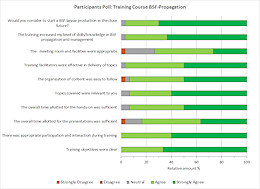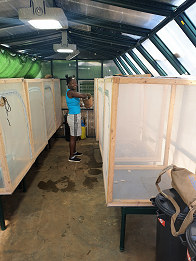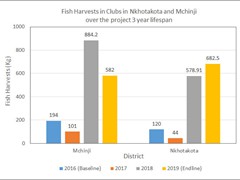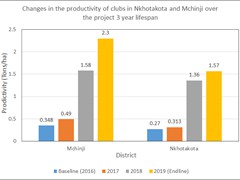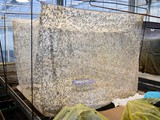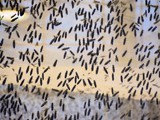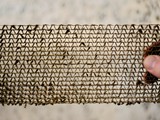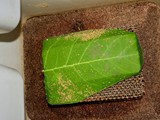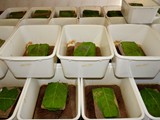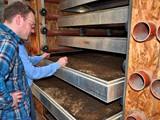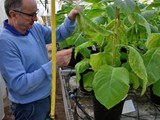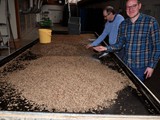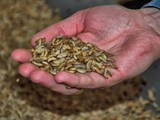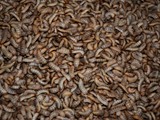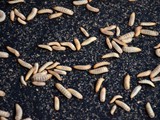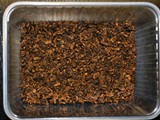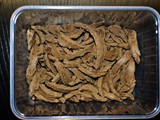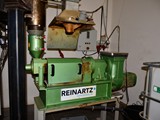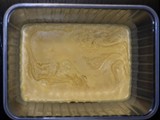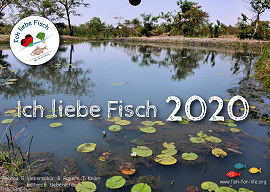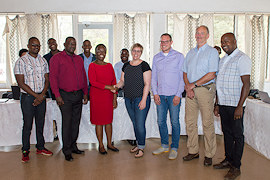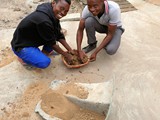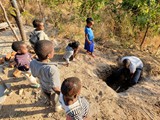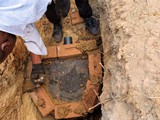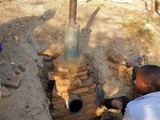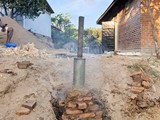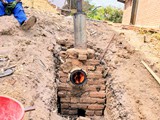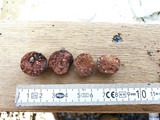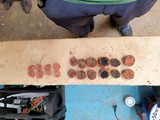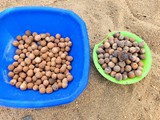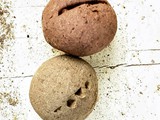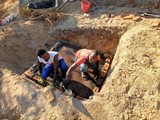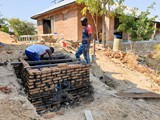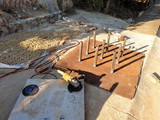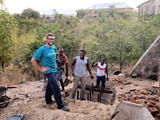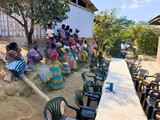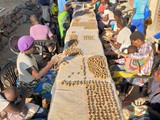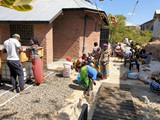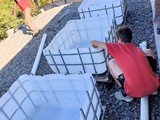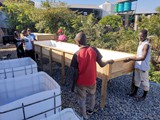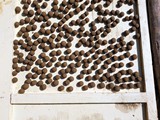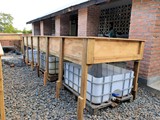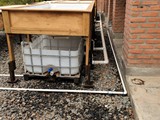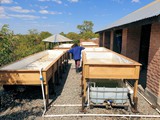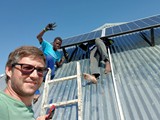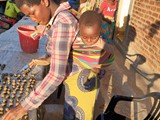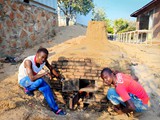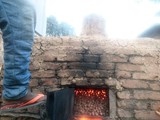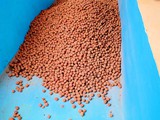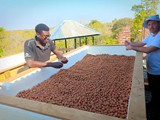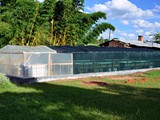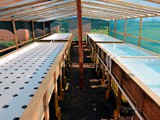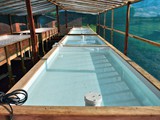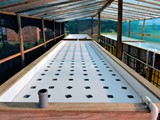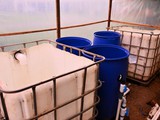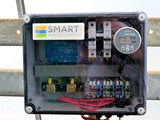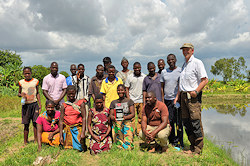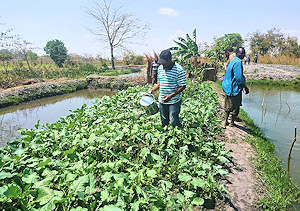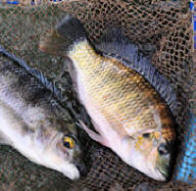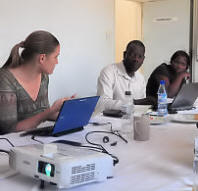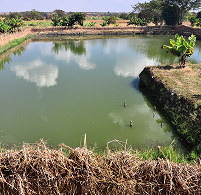NEWS FROM THE PROJECT
Latest news about the project will be provided at this page. If you want to be kept informed about the progress in the project, frequently come back to this resource.
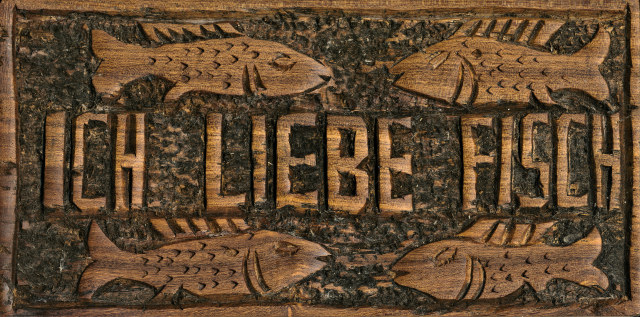
This nice hand-carved wooden plate with the acronym of the project (I love fish) was a gift from the Malawian team to the German partner and handed over at the farewell party in April 2018, celebrating the successfull overall cooperation and speficically the accomplishment of the solar powered hatchery
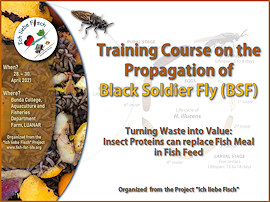 Training
course on BSF-propagation accomplished from 28th -
30th of April 2021. A full 3-days training course
about the propagation of the Black Soldier fly was
accomplished at the Bunda campus farm.
Training
course on BSF-propagation accomplished from 28th -
30th of April 2021. A full 3-days training course
about the propagation of the Black Soldier fly was
accomplished at the Bunda campus farm.
Among the most important outreach activities in the "Ich liebe Fisch"-Project were training courses for the stakeholders, in this case mainly the rural farmers who are running an aquaculture and /or an agriculture business.
The training course on the propagation of the Black soldier fly was initially planned for the end of 2020, in combination with a closing meeting for the whole project. However, because of the Corona pandemic, a couple of activities had to be postponed into 2021, among those the training course about the propagation of the BSF. In order to be able to conduct the training course properly, the pilot plant for the production of BSF larvae at the Bunda college needed to be in full operation. This was achieved in the beginning of 2021.
Thus, a full 3-days training course was accomplished from the 28th until the 30th of April 2021. The full invitation text and the workshop agenda can be accessed from here.
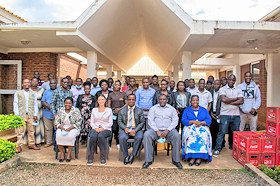 There was an overwhelming interest in participating
in the workshop. Approval of the applications were
based on the background and the motivation of the
applicants. About 30 farmer, extension officers,
students and technicians were finally invited to
participate in the workshop. With the support of the
GIZ youth employment project in Malawi it was
possible to invite more participants as initially
planned. The "Ich liebe Fisch"-Project appreciated
this support.
There was an overwhelming interest in participating
in the workshop. Approval of the applications were
based on the background and the motivation of the
applicants. About 30 farmer, extension officers,
students and technicians were finally invited to
participate in the workshop. With the support of the
GIZ youth employment project in Malawi it was
possible to invite more participants as initially
planned. The "Ich liebe Fisch"-Project appreciated
this support.
According to the results of a participants poll which was conducted at the end of the training, it can be considered as a great success. 97% of the participants were never before in touch with the topic BSF propagation, but after the training, about 95% of the participants noted that they will consider to kick-off a BSF production in their communities in the next future. In order to support the practical start of a BSF production, the farmers were invited to build a Biopod in the training course (material supplied from the project), a special box which is aiming to attract wild BSF to lay their eggs inside. This Biopod was considered as a starter kit to trigger the propagation of BSF.
Some impressions from the BSF workshop activities.
Some workshop presentations can be accessed in the public repository of this website.
After busy months and with the tireless support of two German volunteers, the infrastructure of the BSF pilot plant was finished mid of January. The pilot plant mainly consists of the mating house with the mating cages and the larvarium for rearing the larvae until pupae stages.
In addition, a number of auxillary tools have been constructed, among these traps to gather eggs from wild BSF females to build up broodstocks for the pilot plant and a solar dryer which shall be used to dry maggots before further processing as fish food.
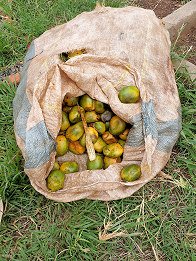 At the beginning of the project, it
was still unknown, to what extent the Black Soldier Fly is
naturally abundant
in Malawi. However, according to the investigations
of the project and the trials with traps to attract
wild females to spend their eggs in the traps, it
was revealed that the BSF is apparently widespread
in Malawi. These are very good news against the
background of the use of BSF by rural fish farmers.
At the beginning of the project, it
was still unknown, to what extent the Black Soldier Fly is
naturally abundant
in Malawi. However, according to the investigations
of the project and the trials with traps to attract
wild females to spend their eggs in the traps, it
was revealed that the BSF is apparently widespread
in Malawi. These are very good news against the
background of the use of BSF by rural fish farmers.
Subsequently, broodstocks were successfully established based on the eggs of wild BSF and a whole range of substrates has already tested for their suitability for growing BSF larvae. It was specifically important to assess those types of organic waste that are available free of charge and sustainably in Malawi. Among those organic sources tested were potato peels, trashed Mangos, wrotten tomatoes and bananas. Among other measures, the proper treatement of the organic substrates such as crushing and fermentation are an important part of the rearing process. The first results are quite promising and further experiments are being conducted to find out e.g which mixture of organic waste promotes the growth of BSF larvae the most.
There are still quite a few open issues on the way to a regular and optimized BSF production in the pilot plant and many tiny things to learn, but the Malawian team will certainly be able, with the help of the German team, to achieve at the end the desired results. Please come back, we will frequently report about the progress in BSF propagation at the Bunda college farm. Some impressions about the activities at the BSF pilot plant at the farm of the Bunda college.
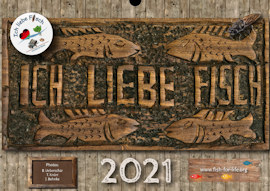 "Ich
liebe Fisch"-Project Calendar 2021 now
available as download.
"Ich
liebe Fisch"-Project Calendar 2021 now
available as download.
It has almost become a rule, that the project is compiling an annual calendar for the "Ich liebe Fisch"-project. The calendar for 2021 is actually the fifth in a row...
This year it was specifically challenging, since the project was quite behind of the schedule with the tasks to accomplish because of the Corona restrictions and it was not possible for the project coordinators to work this year in Malawi and as a bye-product to bring lots of nice photos which are appropriate for the calendar due to travel issues. Nevertheless, with the help of the team which is working at present in Malawi, and some stock photos from the previous year, it was possible to compile hopefully again a quite sounding project calendar. The calendar is available as download in pdf-format (about 20 Mb).
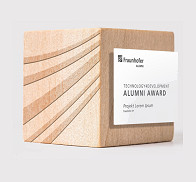 The
"Ich Liebe Fisch"-Project was nominated for the
Fraunhofer-Alumni-Award "TECHNOLOGY
4DEVELOPMENT".
The
"Ich Liebe Fisch"-Project was nominated for the
Fraunhofer-Alumni-Award "TECHNOLOGY
4DEVELOPMENT".
The project is nominated among 4 other projects for this prestigous award. These projects have all the same goal, to improve the living conditions in developing countries. The award comes with a donation of 10.000€ which shall be used to support the local activities of the projects.
Each project is being presented with more details to support the jury members to make an informed decision. The presentation of the "Ich liebe Fisch"-Project, including a video, can be accessed from here.
The coordinator of the "Ich liebe
Fisch"-Project in Malawi, Prof. Daud Kassam,
reports his point of view how this project
contributes to the development of more fish
production in Malawi, specifically for the rural
farmer (above). A fisheries extension officer who
was involevd into the implementation of the "Ich
liebe Fisch"-Project in Nkhotakota district reports
about the impact of the project (middle). A community
member from a fish club in Mchinji reports about the
changes in his life after the "Ich liebe
Fisch"-Project has applied various measures to
improve the fish production in his district.
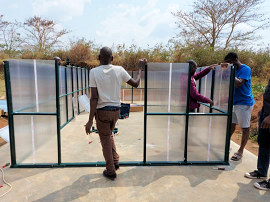 The
Greenhouse for the BSF production was successfully
assembled at the Bunda College farm
The
Greenhouse for the BSF production was successfully
assembled at the Bunda College farm
The greenhouse which is dedicated as mating house for BSF was constructed under supervision of the German partner GMA from a team of project participants, students and groundworker within a couple of days.
The greenhouse is an important part of the pilot plant for insect protein production in the "Ich liebe Fisch"-project and was delivered as a pre-tailored construction kit to provide a standardized and in the long-term stable construction as mating house for BSF propagation.
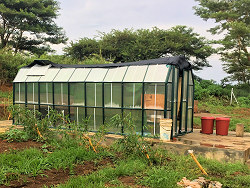 Next step is to install the
interieur such as illumination, power
outlets, storage racks and the mating cages.
Next step is to install the
interieur such as illumination, power
outlets, storage racks and the mating cages.
The 10-12 mating cages, which will be placed inside of the greenhouse needs to be assembled individually. Since the construction plan for the mating cages is a "homemade" design from the project partner GMA with B. Ueberschär, an instruction video on the construction of these cages was produced from the German project partner. This construction advices shall be used from the Malawian partner if the German partner cannot attend and supervise the construction personally due to the present travel restrictions. This measure makes sure, that the project progress is not hampered until travel restrictions are withdrawn.
 how to embed video in wordpress by VideoLightBox.com v3.1
how to embed video in wordpress by VideoLightBox.com v3.1
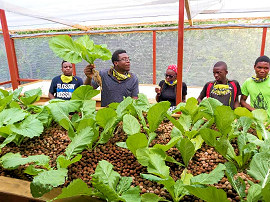 Experimental
production of clay pebbles for aquaponic systems in the "Ich liebe
Fisch"-Project developed into a small business for
villagers in Nkhotakota district
Experimental
production of clay pebbles for aquaponic systems in the "Ich liebe
Fisch"-Project developed into a small business for
villagers in Nkhotakota district
Through the Ich Liebe Fisch Project in Malawi which was funded by the German government, Aquaponics technology has begun gaining popularity as many people are showing interest in adopting. Ich Liebe Fisch project installed two aquaponics systems, so far the biggest in Malawi. These systems were designated by LUANAR as technology transfer nodes, which play a major role in educating Malawians about aquaponics gardening. One system was installed in Bunda College while the other one in Benga Parish.
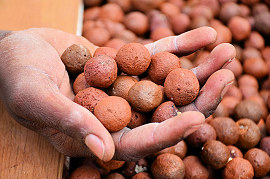 Through the
supervision of German representatives and a Bunda Student, Benga parish rolled out a series
of experiments on local clay pebble production.
About 20 different types of clay were tested for
their porosity, stability and lightness.
Different ratios of additives (baking soda,
maize bran, rice bran and saw dust) that create
pores within pebbles were also tested. Baking
soda was firstly withdrawn since it showed no
significant difference in weight compared to
other additives, which made it more expensive.
Maize bran product was relatively light, but it
lacked stability as it left large poles. Saw
dust was light and stable compared to baking
soda, but it is not readily available in Malawi.
Finally, rice bran stood out to be the best in a
ratio of 2:1 (2 parts clay one part bran) as it
is stable, readily available, light, and cheap.
Through the
supervision of German representatives and a Bunda Student, Benga parish rolled out a series
of experiments on local clay pebble production.
About 20 different types of clay were tested for
their porosity, stability and lightness.
Different ratios of additives (baking soda,
maize bran, rice bran and saw dust) that create
pores within pebbles were also tested. Baking
soda was firstly withdrawn since it showed no
significant difference in weight compared to
other additives, which made it more expensive.
Maize bran product was relatively light, but it
lacked stability as it left large poles. Saw
dust was light and stable compared to baking
soda, but it is not readily available in Malawi.
Finally, rice bran stood out to be the best in a
ratio of 2:1 (2 parts clay one part bran) as it
is stable, readily available, light, and cheap.
Mass production of clay pebbles from a locally constructed kiln was done for the Benga Parish system. This work took almost a moth to produce about 4 cubic meters of clay pebbles. About 40 village women were hired to roll the pebbles and the cost was reduced to about 80% compared with imported hydroton (see also here).
The Aquafish project from Bunda College adopted the "Ich Liebe Fisch" clay pebbles production method and ordered about 7 cubic meters for Bunda system. This production was independently done by young people and women from Nkhotakota district who went through production trainings. This was done specifically to encourage villagers to take clay pebble production as a business.
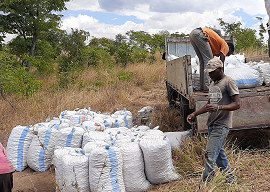 The young
people and women have so far made income
of over 4,000 Euro from clay pebble production
which they have used to buy basic home
necessities, seed and fertilizer for maize crop
production. The whole clay pebble production
process was a success despite having challenges
in kiln design which at first required a thick
iron mesh to hold the pebbles at high
temperatures. This material was scarce hence had
to be resolved
to a local way which proved to be effective.
Currently, Benga parish has ordered for some
clay pebbles and production will start soon by
the villagers. Different stakeholders have
started enquiring about clay pebbles and soon
people will get used to buying clay pebbles for
aquaponics.
The young
people and women have so far made income
of over 4,000 Euro from clay pebble production
which they have used to buy basic home
necessities, seed and fertilizer for maize crop
production. The whole clay pebble production
process was a success despite having challenges
in kiln design which at first required a thick
iron mesh to hold the pebbles at high
temperatures. This material was scarce hence had
to be resolved
to a local way which proved to be effective.
Currently, Benga parish has ordered for some
clay pebbles and production will start soon by
the villagers. Different stakeholders have
started enquiring about clay pebbles and soon
people will get used to buying clay pebbles for
aquaponics.
Malawi has great potential in aquaponics which is yet to be exploited. The "Ich Liebe Fisch"-Project has proven aquaponics to be one of the most efficient and sustainable food production methods in Malawi. However, further research is needed to in order to optimize the industry as far as Malawian conditions are concerned. A start-up was registered in Malawi (Aquaponic for Life) from the key persons in aquaponic research in the "Ich liebe Fisch"-project to promote the production of vegetables and fish with the aquaponics apprach in the country.
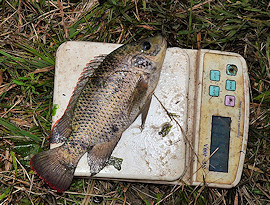 Fish production in both intervention districts Mchinji and Nkhotakota significantly increased over the 3-years period the project was running
Fish production in both intervention districts Mchinji and Nkhotakota significantly increased over the 3-years period the project was running
The data for the evaluation of the yield were mainly taken at the annual harvesting events in the communities and also includes data provided from the local fisheries officer. With the project geared to increase production of O. karongae, the values from the endline survey suggest in addition an impact of the project intervention. The proportion of farmers who cultured O. karongae (Chambo) species in Mchinji increased from 42.9% at baseline to 70.3% at end line, whereas, in Nkhotakota it increased from 25% at baseline to 43.5% at end line.
These are excellent results and the projects activities to improve the fish production can be considered as a success story. The complete datasets and the interpretations in the endline survey will be made available in the final report for the project.
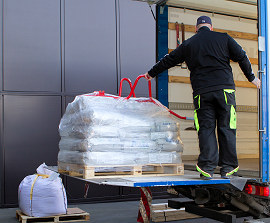 The
German partner have shipped the hardware for the
insect protein pilot production plant
The
German partner have shipped the hardware for the
insect protein pilot production plantAs soon as the equipment has arrived in Malawi, the German partner will travel to Lilongwe to supervise the compilation of the pilot plant. After a short introductional period, the Malawian partner will accomplish the planned experiments in the facility. Finally, a training course is planned to introduce the major principles of BSF rearing and the "translation" of the methods into the local conditions of rural fish farmer.
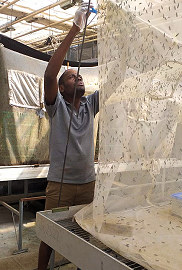 From mid of March until end of
July
2020, two Malawian masterstudents from project
partner LUANAR accomplish an internship at Hermetia
From mid of March until end of
July
2020, two Malawian masterstudents from project
partner LUANAR accomplish an internship at HermetiaAdd on: due to the corona crisis, the duration of the internship needed to be extended until beginning of August (no scheduled flights available to Malawi). However, the extension of the internship can be considered as a win-win situation for both, the company Hermetia and the students. The company got some substantial support in the routine production of BSF in a situation where some employees had to stay at home to care about their family and the both students acquired substantially more expertise in BSF rearing as would have been feasible in a six-weeks internship duration (as initially planned).
A detailled report about the activities of the internship of the two Masterstudents is available in the public repository.
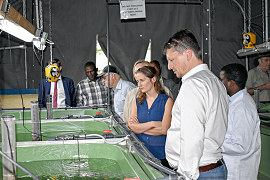 The
Lilongwe University of Agriculture and Natural
Resources (LUANAR) has become the first public
University in Malawi to get its programmes
accredited internationally
The
Lilongwe University of Agriculture and Natural
Resources (LUANAR) has become the first public
University in Malawi to get its programmes
accredited internationally
In addition, the hatchery at the Bunda farm was accredited as the country's leading source of Oreochromis karongae fingerlings which means a clear impact of the project on the sector in Malawi.
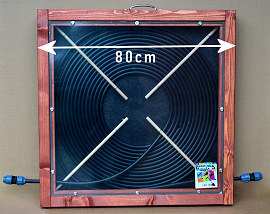 Demo
solar heater constructed from the project partner
GMA
Demo
solar heater constructed from the project partner
GMA
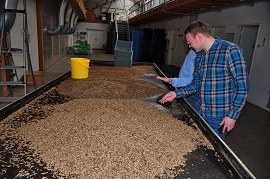 The
German project coordinator from EMB and GMA have
visited the project partner Hermetia
in Baruth beginning of February
The
German project coordinator from EMB and GMA have
visited the project partner Hermetia
in Baruth beginning of February
The calendar can be downloaded as pdf-file.
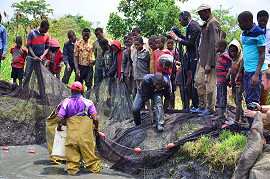 Harvesting
fish in Mchinji district in October 2019
Harvesting
fish in Mchinji district in October 2019
The weight and length of representative sub-samples of individual were recorded from each pond for calculation of the growth rates. These data will be part of the next annual report.
The farmer are using part of the harvest for own consumption, but are also selling a big chunk to individuals from other villages and at the local markets. One kilo of fish yielded about 2500 MK (farm gate price) which is being considered a reasonable price. Some pictures of the charvesting event are available at this page.
“The agency is indeed impressed with the progress we have witnessed so far. The project is really producing tangible results that will have a direct positive impact in the aquaculture and nutrition sector in Malawi,” she said. During the evaluation visit, the donor also handed over the technology which the project has brought to LUANAR. The technology includes the state of art solar hatchery which has improved the quality and quantity of fingerlings being produced at the university and also the aquaponics system which is a new technology at the institution that allows simultaneous growth of fish and vegetables.
Speaking in an interview, the Bunda Campus Director, Dr. Agnes Mwangwera thanked the donors through the "Ich liebe Fisch" project for the significant contribution they have made to the university. “We acknowledge the support that we have received from the German government through the "Ich liebe Fisch" project. The support is helping us in addressing the challenges that we are facing in the Malawian aquaculture and nutrition sector,” Dr. Mwangwera said. She further said that the project has helped LUANAR in many things including capacity building that has been happening at the university. This includes the technologies that have been received, the trainings that have been conducted with both the fish farmers and the students and also the support to the students that have participated in the project.
During her visit in Malawi, the donor representative visited the participating rural communities in Mchinji and Nkhotakota. Ms. Bystry used the opportunity to interview a couple of members in both communities in order to get a first-hand impression on the impact of the measures which were applied in the communities from the project.
An article about the project´s closing session and evaluation was posted in the news letter of LUANAR. Some photos of the closing session and the visit in the communities are available at this page.
The presentations of the closing meeting are avilable in the project repository in the section public documents.
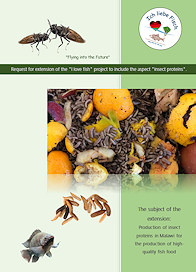 Project
extension on the pilot production of insect proteins
in Malawi approved
Project
extension on the pilot production of insect proteins
in Malawi approved
However, the project
has identified another significant problem
which concerns the poor feed quality for
growing and adult fish. The farmers in the rural
communities cannot afford imported,
fully-fledged feed (industrial pelleted
feed with fish/soy meal content) for fish
farming due to the high costs and therefore
mainly use waste from maize processing (maize
bran). This makes the step from pure (rather
inefficient) self-sufficiency to small-scale
commercial production very difficult because the
full growth potential of the fish is far from
being optimally exploited. For this reason, the
project consortium sees a considerable need for
action in the development of suitable protein
sources for fish nutrition within Malawi, in
order to produce full-fledged, but also
affordable fish feed for rural aquaculture
farmers.
Thus, the project "Ich liebe Fisch" has planned a pilot plant on the farm of the Bunda Campus in order to identify and optimise the various aspects of black soldier fly insect production in Malawi and to provide training for aquaculture farmers on this subject. The pilot plant should have a size and technology that is directly transferable to the conditions and options of the aquaculture farmers. This project extension was kicked-off at beginning of October 2019 and will be accomplished in December 2020.
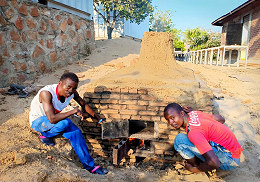 Clay
pebble production as substrate for Aquaponic
facilities established at Benga Parish
Clay
pebble production as substrate for Aquaponic
facilities established at Benga Parish
In an aquaponic system, the role of the substrate has greater importance compared with the hydroponic system, because unlike the latter, in which the soluble nutrients added to the water are adequate for utilization by plants in aquaponics, the nutrients need to be converted into easily available forms, such as organic nitrogen, which through the action of microorganisms is converted into ammonia, which is later transformed into nitrate through the action of nitrifying bacteria. Thus, the substrate for aquaponics has an additional function, acting as an adequate base for fixation of microorganisms.
The characteristics of the various materials used as substrate directly and indirectly affect plant development and production. Aeration is an important factor affecting crop yield, since oxygen is a necessary element for cellular activity, involved in the breathing process, and when absent from the root system causes damage to the plant metabolic development. Therefore, substrate structure influences crop development, mainly for soilless crops. In brief, the choice of substrate in an aquaponic system must meet the appropriate water and air proportions that meet the plant needs.
Foamed clay pebbles are established as an appropriate substrate for the cultivation of vegetables in aquaponic facilities, since the pebbles provide a large surface which facilitates the establishment of nitrifying bacteria.
Due to unavailability of such industrially produced clay pebbles necessary as growing medium the "Ich liebe Fisch" project decided to establish a production in Malawi. Under the supervision of two project volunteers from Germany, a solar powered aquaponic facility, similar to those at the Bunda Campus farm, was build at the area of the Benga Perish (a partner in the "Ich liebe Fisch" project). Gravels as a substrate were not considered since gravels are to heavy for the wooden constructions of the aquaponic units. Thus, a clay pebble production was started at the Benga Parish. A number of trials was necessary to identify the proper clay and an optimized composition of the pebbles. Moreover, a kiln had to be constructed for baking the pebbles. About 20 different kind of clay-containing soil around the site of the Benga Parish were tested to find the clay with the highest stability after being baked.
To achieve a similar porosity as the industrial produced foamed clay pebbles, the clay was mixed with different organic material which will burn out in the high temperatures of a pottery kiln (around 800° Celsius) and leave pores. Saw dust proved to be ideal but was not available in the quantity needed to burn about 4 cbm of pebbles. It turned out that using maize bran had similar results and could be used in a certain mixture with the clay without losing too much stability of the pebbles. To find the right clay and compositions, a small test kiln was built in order not to save wood in the trial period.
Subsequently, for the mass production of the clay, people from the local communities were hired and a larger kiln was constructed which is able to burn about 0.7cbm of pebbles in one baking trial. 40 workers can produce around one cbm of clay balls in 2 working days/6 hours each day.
Once aquaponic units become more common in Malawi, the production of clay pebbles may be developed to a small business for people in rural communities.
Please click on the pictures to see a larger size.
 lightbox video by VideoLightBox.com v3.1
lightbox video by VideoLightBox.com v3.1
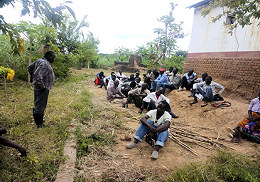 Nkhotakotas
farmers on educational visit
Nkhotakotas
farmers on educational visit
The "Ich liebe Fisch"-project is mainly working with communities in two districts; in Nkhotakota and Mchinji districts. Mchinji district is located in the upland areas of Malawi, a few hundred kilometers away from the Lake Malawi and has a relatively longer history in fish farming unlike the traditionally fishing lakeshore communities in Nkhotakota where fish farming remains a relatively new concept. The farmers in the communities in Nkhotakota reported that the oldest pond they have dates back to around 2004 which would put fish farming in the area 15 years old.
The
project team thus recommended special measures
aiming to address the disparities in the two
communities with the goal to attract community
members in Nkhotakota to become more encouraged in
aquaculture. Against this background, the "Ich Liebe
Fisch"- project
team took farmers in Nkhotakota on a visit to the
farm of Mr. Msyali in the same district. Mr. Msyali
is one of the oldest and leading farmers in the
district practicing integrated Agri-Aquaculture
(IAA) who has also received support through the
"Ich
Liebe Fisch"-project.
The training was organized for educational and
motivational purposes to improve the farming
operations of the farmers under the project.
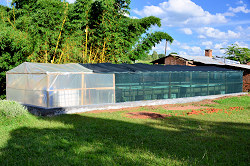 Aquaponic
unit assembled at the Bunda Campus farm
Aquaponic
unit assembled at the Bunda Campus farm
In addition to the barrelponics system which was build and tested in the project, a larger Aquaponic unit was planned and constructed on the farm of the Bunda Campus in February - March 2019.
The unit is almost ready to start to operate. The same type of unit will be constructed at the Benga Parish in Nkhotakota district and will be used, apart from producing vegetables and fish, as a template for the local communities, which may consider to build a similiar system in their villages. This system will be powered with the same solar facility as the smaller barrelponics unit. More details coming soon.
Please click on the pictures to see a larger size.
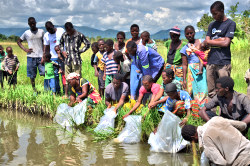 Third
campaign on tilapia fingerlings and feed delivery
started in March 2019
Third
campaign on tilapia fingerlings and feed delivery
started in March 2019
The project has started the third times to deliver fingerlings and feed to the communities which are participating in the "Ich liebe Fisch"-project.
The project started with the delivery of fingerlings and feed for two communities in Mchinjidistrict end of March. The Ntawa and Chikondi fish clubs got fingerlings which were reared at the Bunda farm with support of the solar powered hatchery including proper feed for the first month (more feed batches will follow). Ntawa received about 10,000, Chikondi about 4000 fingerlings. The number of fingerlings to deliver was calculated on the size of the ponds of the fish clubs. The clubs got fingerlings from 3 species, O. karongae (Chambo), O. shiranus and hybrids. A full report about the delivery of this campaign will be available soon. Some photos of the delivery event are available at this page. The campaign will be continued with the delivery of fingerlings to the other fish clubs in Mchinjiand Nkhotakota district.
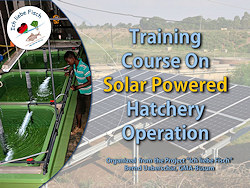 Training
Course On Solar Powered Hatchery Operation
Training
Course On Solar Powered Hatchery Operation
From the 12th to the 14th of March 2019, a full 3-days training course on solar powered hatchery operation was accomplished at the Bunda campus farm.
Fish farmer, technicians, extension worker, instructor and district fisheries officer participated in this training course. According to the results of a questionnaire which was distributed at the end of the training course, most participants provided a very positive feedback. There were many requests for repeating such kind of training courses in the future. A full report about the training course with details on the rating will be available soon.
Course content in brief
i) Introductory presentations ii) Guided tour to Bunda Campus aquaculture and fisheries department and farm operation iii) Introduction into the solar power facility iv) Broodfish management at the farm and present production methods for fingerlings v) Quality of feed for juveniles and adults vi) Hatchery operation: explaining the technology, hands-on training, including maintenance, monitoring water parameter, feed and feeding technology.
Workshop agenda and training course presentations are available in the public project repository of this website. A report can be downloaded from the public repository. Videos & pictures from the workshop are now available.
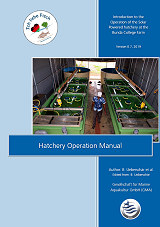 Introduction
to the operation of the
solar powered hatchery at
the Bunda College Farm,
Version 1.0, 2019
Introduction
to the operation of the
solar powered hatchery at
the Bunda College Farm,
Version 1.0, 2019
One of the major goals of the project ¨Ich liebe Fisch "was to establish technologies which improve significantly the stable supply of viable fingerlings to farmers which want to grow fish for food and for the market. To achieve this goal, the project has provided a solar powered indoor hatchery which is designed to support intensive production of tilapia fingerlings, specifically for Oreochromis karongae (Chambo). A hatchery Operation manual was compiled in order to introduce into the operation of the solar powered hatchery at the Bunda College Farm. This manual will be submitted to the participants in a training course on hatchery operation in March 2019 at the Bunda Campus Farm. Download the manual as pdf.
Please note: according to the experience in the training course on solar powered hatchery operation which was accomplished from the 12th to the 14th of March 2019 at the Bunda Campus farm, an update of the manual will be available soon, specifically with more information and instructions on water quality measurements and larval feeding. Please come back to this site and watch out for the version number of the manual
New version 1.0 available, May 2019: Some modifications in the existing text, new chapter on water parameter mesurements, larval feed and general introduction on tilapia propagation added.
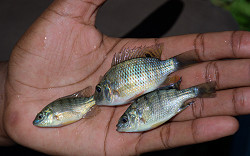 The
solar powered hatchery of the project "Ich liebe
Fisch" made it to the cover story in the
Hatcheryfeed magazine from December
2018
The
solar powered hatchery of the project "Ich liebe
Fisch" made it to the cover story in the
Hatcheryfeed magazine from December
2018
The volume 6, issue 4 of the Hatcheryfeed Magazine featured an article about the solar powered hatchery which was assembled and put into operation at Bunda farm in 2018. The title of the report: "Implementation of new hatchery technologies to improve the supply of tilapia fingerlings for rural farmer in Malawi". The article presents the general framework of the "Ich liebe Fisch" project but specifically deals with technical details and the expected outcome of the hatchery. Read more online or download the article as pdf.
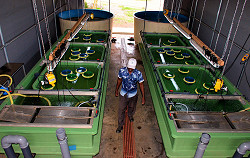 Two
German project partner from GMA and
EMB visited the "Ich liebe Fisch" project in
Lilongwe in November 2018
Two
German project partner from GMA and
EMB visited the "Ich liebe Fisch" project in
Lilongwe in November 2018
The visit was dedicated to solve some issues with the solar power facility and to kick-off the full operation of the hatchery and the MCDonald unit for egg incubation. Another activity was the organisation of a training course in molecular biology and cryopreservation which was conducted from 6th to 10th November 2018. The training aimed at equipping students with skills on molecular biology and how to use them. Students were offered practical sessions in areas of DNA extraction, DNA amplification, gel electrophoresis and allele scoring, and the long term preservation of biological material like semen using liquid nitrogen. Overall, it was a very successful activity, Since then, the solar powered hatchery works without any hassles. Some more pictures from these activities will be available soon. Read more about the training course.
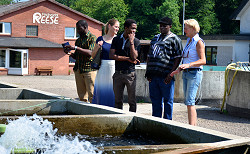 The
Malawian coordinator of the "Ich
liebe Fisch" project visited the German partner
The
Malawian coordinator of the "Ich
liebe Fisch" project visited the German partner
A project meeting among the Malawian and the German coordinator was organized in Germany at the EMB and GMA from 29th of July to 6th of August 2018. The meeting took place in the period when the two master students were trained in the German partner institutes. The meeting was due to disuss project matters for the next year and beyond. While being in Germany, the Malawian guests had the opportunity to visit a typical German pond aquaculture farm. The project partner were appreciating the nice hosting and the guided tour at the fish farm Reese.
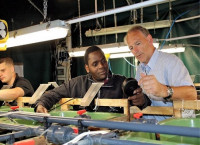 Two
Masters students in Aquaculture and Fisheries
Science were being hosted by two German research
institutions
Two
Masters students in Aquaculture and Fisheries
Science were being hosted by two German research
institutions
Under a sponsored exchange visit by the project "Improving Community Health-Nutrition Linkages Through Solar Energy-Based Fish and Crop Integrated Value Chains" – Ich liebe fisch (I love fish), in partnership with Africa Center of Excellence in Aquaculture and Fisheries Science (AquaFish ACE) at Lilongwe University of Agriculture and Natural Resources (LUANAR), two Master students were visiting the German partner institutes, the Fraunhofer Research Institution for Marine Biotechnology and Cell Technology (EMB) in Lübeck and the Association for Marine Aquaculture (GMA) in Büsum for almost 3 months. The students were receiving hands-on training in Fish Genetics and Molecular Biology, Cryopreservation of fish gametes and its possible application in aquaculture and in advanced fish larvae rearing techniques for the mass production of quality fingerlings. Read more...
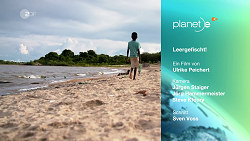 8th
of July: Documentary about the project "Ich liebe
Fisch" broadcasted in the ZDF
8th
of July: Documentary about the project "Ich liebe
Fisch" broadcasted in the ZDF
A film team visited the project in Malawi in April 2018 in order to compile a documentary about the project "Ich liebe Fisch". The film team was contracted from one of the large German public-service television stations, the ZDF. The documentary was shown within the series of the e-Planet contributions. The documentary be accessed from the Mediathek of the ZDF but can be alo watched at YouTube. Please note, that restrictions may apply when accessing the link from foreign countries. In that case, please inform the adminsitrator of this site. Additional interviews with the German team, taken during production of the project documentation in Malawi and Germany can be accessed at the video resource of this site.
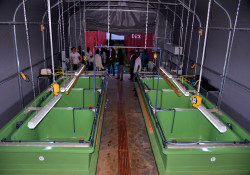 Hatchery
and Solar power plant successfully assembled at
Bunda College
Hatchery
and Solar power plant successfully assembled at
Bunda College
The German
project team travelled to Malawi in spring 2018 in
order to set up a solar powered hatchery
on the ground of the farm of
the Bunda colleage. Construction of the hatchery
started on 26th March this year and its main focus
is on the production of fingerlings of Oreochromis
karongae (the real Chambo and the most favourable
Tilapia species in Malawi). Together
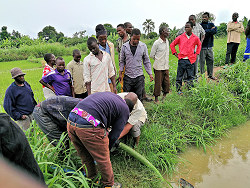 Pond
inspections of the participating communities in the districts of Nkhotakota and Mchinji in February 2018
Pond
inspections of the participating communities in the districts of Nkhotakota and Mchinji in February 2018
A trip was
organized to the
participating communities in the
districts of Nkhotakota and
Mchinji at the 8th and 10th
of February
2018. These
project activities
aimed at assessing the fish ponds and making them
ready for the projects implementation phase. At the
beginning of the projects pilot phase in the
preceding year of 2017, the project organized a
seminar which involved the first extensive pond
preparation trainings. The farmers were asked to
prepare their ponds for the second phase of the
project hence this trip was arranged to follow up on
the progress and reach out to the pond preparation
challenges farmers were facing on the ground.
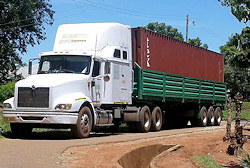 Container
arrived at Bunda College
Container
arrived at Bunda CollegeThe container with the hatchery, photovoltaic facility and many other equipment finally arrived at the 19th of January 2018 at the Bunda college in Lilongwe. After a long journey, the content of the container is apparently complete and undamaged. in order to assemble hatchery and PV facility and to facilitate the application of aquaponic techniques. Some pictures of the stowing procedure are available at the picture repository of this site. German Team visited the Project in November/December 2017
The German team travelled to Malawi from end of November until end of December 2017 to attend the project and to accomplish a couple of tasks together with the project partner from Malawi.
Although deviations from the original schedule for this visit in Malawi were necessary (the container with the stuff for hatchery and solar power plant was delayed), the visit of the German partner was very useful. Various meetings at the Bunda college were organized, plans of the coming activities in 2018 discussed, lectures given in classes of the Fisheries and Aquaculture Department and concepts for Master theses developed with those students who are designated to come to Germany.
Another important activity was the visit of the participating communities in Mchinji and Nkhotakota. The German team spend a couple of days in Nkhotakota at the Malawi lake and organized, with the help of the local district fisheries officers, a meeting with key members of the local community. A lot of aspects were discussed, it was important to learn for the German team that many of the project activities which were accomplished so far went into the right direction. Nevertheless, there were a couple of issues identified which still need improvements and corrections.
Another trip went to the participating communities in Mchinji with more or less the same program compared to the trip to Nkhotakota. In summary, the communities in Mchinji were more comitted to their aquaculture activities, thus the measures to improve pond management were more appreciated in the communities of this district.
In addition, some other meetings were organized, such as a brainstorming with representatives from World Fish, the organisation is aiming to intensify their activities in Malawi. Areas of common interest were identified where the project might cooperate with the World Fish activities.
In summary, this visit in Malawi yielded in the acknowledegment of the major obstacles for successful aquaculture in Malawi: lack of fingerlings to stock the ponds properly, specifically lack of O. karongae offsprings, lack of proper feed for ongrowing fish; deficiencies in knowledge on proper pond and water management and a general failure of electricity supply. Alle those issues were were initially adressed in the project´s application and are further in the focus of the project.
Some pictures of the visit are available at the picture repository of this site.
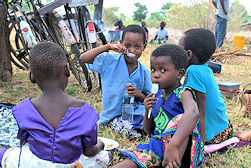 Training
in fish harvesting, food processing,
product
development, sensory evaluation and marketing
Training
in fish harvesting, food processing,
product
development, sensory evaluation and marketing
The training sessions were
conducted in Nkhotakota from 6th -10th November and
in Mchinji from 11th - 15th November 2017 with the
following objectives: to establish and revamp care
groups in the project sites, to train farmers in
fish product development, to conduct sensory
evaluation of the developed fish products, to equip
communities with basic nutrition and complimentary
feeding knowledge, to train fish farmers in fish
harvesting and post harvesting handling and to train
communities in marketing of fish and fish based
products.
In November 2017, ten members
from each fish club participating in the project
were trained in fish harvesting techniques and
post-harvest handling methods. In addition, together
with the representatives from care groups they were
trained on basic principles of marketing and record
keeping.
A total of 72 women from the
revamped and established care groups were trained in
a wide number of nutrition topics such as the six
food groups, importance of dietary diversification,
and principles of proper nourishment
of infants and children.
In addition to the women from the
care groups, the training also involved fish
clubs chairpersons and primary and secondary school
students and their patrons.
The attendants were trained how
to optimize preparation of Maize including fish,
vegetable porridge and Cassava, dishes which aims
specifically to improve the nutrition status of
infants and young children under 2 years. They were
also trained how to make fish sausage, fish balls
and fish samosa that are aimed to improve the
nutrition status of the whole family and
to improve their income
through marketing of surplus products.
Some pictures of the training sessions are available at the picture repository of this site.
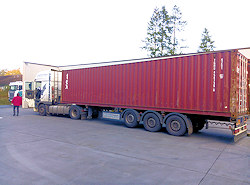 40-ft
Container shipped to Lilongwe
40-ft
Container shipped to Lilongwe
A 40-ft containeraswas packed for the project at Fraunhofer EMB in Lübeck and shipped at the 6th of December with the destination Lilongwe, Bunda College.
The container will bring a complete hatchery for intensive rearing of Tilapia fry, including an egg incubation facility (McDonald type hatching jars), a solar energy plant which will supply continous elctricity for the hatchery and a large industrial tent as housing for the hatchery. In addition, a lot of auxilary stuff was shipped with the container which is needed to assemble the hatchery and the solar power plant and for research purposes. The container is supposed to arrive mid of December in Lilongwe.
Some pictures of the stowing procedure are available at the picture repository of this site.
Following pond stocking on 24th May 2017 and525th May 2017 in Nkhotakota and Mchinji respectivel,, three field visits (once per month) have been conducted with the objectives of monitoring growth of fish and vegetables and also deliver feed which is done monthly. The project team took advantage of the second monitoring trip to assess availability of care-groups and their functionality, to document number of households currently participating in the project; to estimate the prevalence of households with under-five children as well as to document upcoming best practices. The related report summarizes key findings and observations that were made during the three monitoring trips.
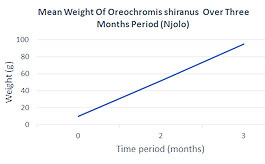
The monitoring team visited further all the three fish clubs participating in Mchinji district. On average, fish is growing well in Mchinji district, although slower than those in Nkhotakota. This might be attributed to lower temperatures in Mchinji. The Jefter Zenasi and Tikondaneish Club were observed to be the best in terms of vegetable production during the first and second monitoring trips. Fish Club were observed to be the best in terms of vegetable production during the first and second monitoring trips.
The assessment of the care groups in the two districts yielded that there is a good participation and commitment in implementing club activities by women and youth. In Mchinji it was revealed that there are functional care groups in all the clubs (except Ntawa club). In Nkhotakota there are no functional care groups in all the clubs. The project will revamp the care groups where they already exist and establish new ones where they do not exist.
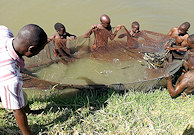
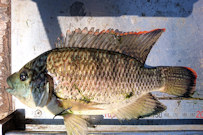
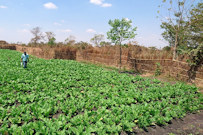
The full report about these monitoring activities and a comprehensive Power Point presentation are available in the protected repository of this site. More pictures are available at the picture repository of this site.
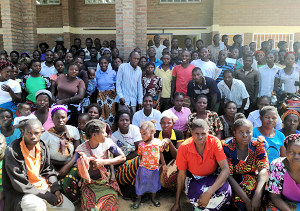 IAA-Training
Courses
IAA-Training
CoursesLUANAR,LUANAR, QUALivE, IFFNT, EMB & GMA, IFFNT, EMB & GMA, IFFNT, EMB & GMA through the project ICH-LIEBE-FISCH (I LOVE FISH) conducted training courses for 285 fish farmers in Nkhotakota and Mchinji District..
The training which was conducted on the 8th to the 9th of May 2017 in Nkhotakota gathered together 145 fish farmers from 11 fish clubs being trained in Integrated Agriculture-Aquaculture (IAA), and grow-out management. Similar training courses were conducted in Mchinji at the 10th to 11th of May 2017 which attracted 140 fish farmers from 4 clubs participating.
According to one of the senior researchers, associate professor Joshua Valeta, the training was aimed to equip farmers with knowledge in IAA & grow-outt managemen. He said that most of the farmers do not make profits because they use lots of inputs sourced externally and they end up harvesting low amount of fish due to a lack of knowledge in best pond management practices. He added that IAA will enable farmers to fully utilize on-farm bio-resources because discard or by-products from one system will be used as inputs in a second production system (e.g. nutrients excreted from the fish will be used to fertilize vegetable) within the farm resulting in greater efficiency.
Integrated fish-vegetable production is a typical IAA set-up which will be implemented through this project and it has potential to improve nutritional status of farmers while improving cash flow. Associated Professor Joshua Valeta mentioned, that the training came in due time of the year just before stocking of the ponds is on the agenda of the farmers. The recently acquired knowledge can be immediately turned into practice.
QUALivES Coordinator Mr Mofolo Sifo said, the training allows farmers to learn about IAA and efficient grow-out technologie; a baseline survey conducted late last year revealed that more than 80% of those farmers who are interested in these techniques however, have no knowledge in IAA. Most farmers did not know about fish-crop integration and its benefits, but as an outcome from these training event, they are all enthusiastic to start integrating fish with vegetables production. The farmers learn, that integration of fish-vegetable production would need less resources (e.g. water for irrigation) and only require small land for greater productivity and increased income.
One of the trained farmer, group village headman Kawele (from Mchinj) thanked LUANAR and its partners for conducting the training events. He emphasized that Mchinji fish farmers will certainly adopt the projects goals beyond the project’s lifespan and they want to become important suppliers of fish and fish products in Malawi.
At the end of the training, the project team distributed Panga knifes and slashers to the farmers in both districts. The tools were distributed to help farmers prepare the ponds and pond stocking is expected before end of May 2017. The tools were distributed in presence of district fisheries personnel who will help to track the clubs that are active in preparing their ponds and need fish seed.
Apart from Mr Sifo and associate Professor Valeta, other training facilitators were Martha Alufeyo and Idrissa Nkwanda.
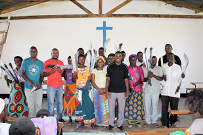
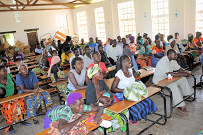
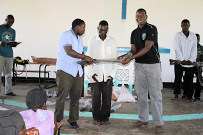
Impressions from the training sessions in Mchinji and Nkhotakota distric,, From lef:: training lessons, Professor Joshua Valeta distributing tool,, group shot with farmers after receiving their tool..
Two field trips were organized in November 2016 in order to inspect and to identify appropriate site, communities and beneficiaries for the project.
From 11th -12th of November, a field visit was organized to Nkhotakota district to identify and inspect sites and innovative fish farmers that the project would work with in the area. Through the same trip it was expected that a potential project site would be identified and sensitization of the communities therein about the project was to follow. Furthermore, a meeting with the Nkhotakota District Fisheries Officer (DFO), District Agricultural Development Officer (DADO), was also arranged to facilitate awareness of government officials about the project.
A field visit was organized to Mchinji to identify and inspect project site and beneficiaries, and to conduct stakeholder consultation meeting (Stakeholder Consultatio, Sensitization and Compilation of Technology platform structures).
The full reports about the site evaluation are available in the public repository of this site.
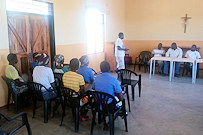
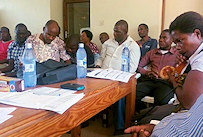
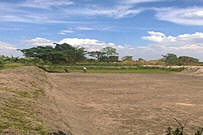
Impressions from the field trips which were conducted to see sites in Mchinji and Nkhotakota district in order to evaluate if these sites suit to the project goals.
Finding innovative ways to boost aquaculture is the only way to meet the demand for fish which by far outstrips present supply.
Current production from
aquaculture is just a mere 3,500 tonnes from
small-scale farms and
sustainable growth strategies for an increasing
self-supply are presently lacking. The major
constraint in Malawian aquaculture is the lack of afast-growing
species, comparable to O. niloticus found in other countries. This problem has been
exacerbated by the fact that the Government of
Malawi Act does not allow import of exotic fish
species (in light of the alien species problems) in
order to protect the biodiversity in Lake Malawi,
which hosts an international fish heritage sanctuary. Taking this into
account, there is a need
to maximize production of native fish specie, which
is only possible through research and innovation. 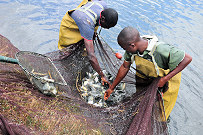
Currently, there are three tilapia species being farmed in Malawi: Oreochromis shiranus, O. karongae and Tilapia rendalli. O. shiranus is widely cultured (about3 93% of all farmers), largely due to its easy handling; but it has a slow growth rate. Although.O. shiranus was subjected to selective breeding program, its growth performance at the 6th generation is not encouraging (25% gains over non improved strains).
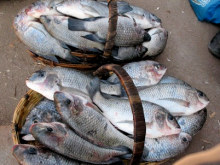 O. karongae grows faster and tastes better and
studies on consumer preference have shown that O. karongae
is preferred over the other Tilapia (Chambo) species
(Kaunda et al., 2005). In a study conducted
by
Andrew et al. in 2003, it was shown that also fish
farmers would prefer to culture O. karongae. But the major problem is its low fecundity and
low larval survival, resulting into insufficient
numbers of fingerlings to supply farmer enough
fingerlings.
O. karongae grows faster and tastes better and
studies on consumer preference have shown that O. karongae
is preferred over the other Tilapia (Chambo) species
(Kaunda et al., 2005). In a study conducted
by
Andrew et al. in 2003, it was shown that also fish
farmers would prefer to culture O. karongae. But the major problem is its low fecundity and
low larval survival, resulting into insufficient
numbers of fingerlings to supply farmer enough
fingerlings.
Being the most preferred fish and due to the low availability from fish farms, overfishing of the wild population has resulted in dwindling catches (reduction of more than 70% in catches over a ten-year period, IUCN red list, 2013.2) to the extent that it has been red-listed as an endangered fish species by the International Union for the Conservation of Nature (IUCN). Therefore, a, major goal of this project is to improve fecundity and larval survival of this fast growing species and to enable farmers to culture this species in large numbers.
In July, the Kick-Off meeting for the project "Ich liebe Fisch" was successfully conducted in Lilongwe from July 19 to22nd, 2016. The venue was the University Lilongwe (LUANAR), at the Aquaculture & Fisheries Science Department.
Representatives from all partners were participating. The meeting was also dedicated to establish a personal contact among all major project partners. Apart from the main meeting, a visit of the exeperimental facilities at LUANAR and a field trip to a model farm were organised.
Agenda for the Meeting
• Welcome
remarks
•
Project contract agreement
•
Work packages review and implementation plan
•
Response toLEBLE questions
•
Project Budget
•
Project area visits
The meeting was considered as very useful and productive; a detailled planning of the first projct year was accomplished. The minutes of the meeting are provided as PDF-download in the protected document repository of this site.
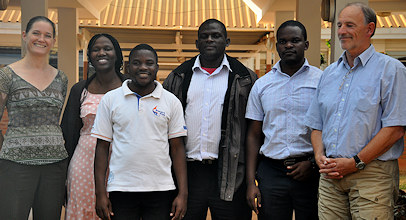
Core representatives from all project partners in Malawi and Germany participated in the Kick-Off Meeting at LUANAR in Lilongwe.
In order to provide some insights into Malawi farm operations including aquaculture, a model-like farm was visited around Bunda community from German and Malawi project partner. The visited farm has a model charakter due to its versatile operation mode.
The farm produces Chambo in two ponds and a number of different crop, such as coconut, banana, honey and other various vegetables.
Since the farm has continous access to water resources (river), it can almost operate independant from the raining season. The farm looks well arranged and the farmer has a clear plan about the style to operate his farm.
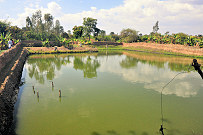
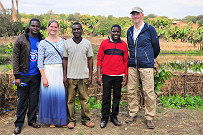
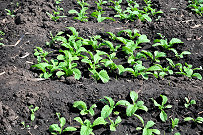
The visit of a model farm provided good impressions about the options in combining aquaculture and crop production under the given conditions (the model farm has continious access to water sources).
Please note: this site is under construction. Copyright ©2018 Fish For Life, www.fish-for-life.org

